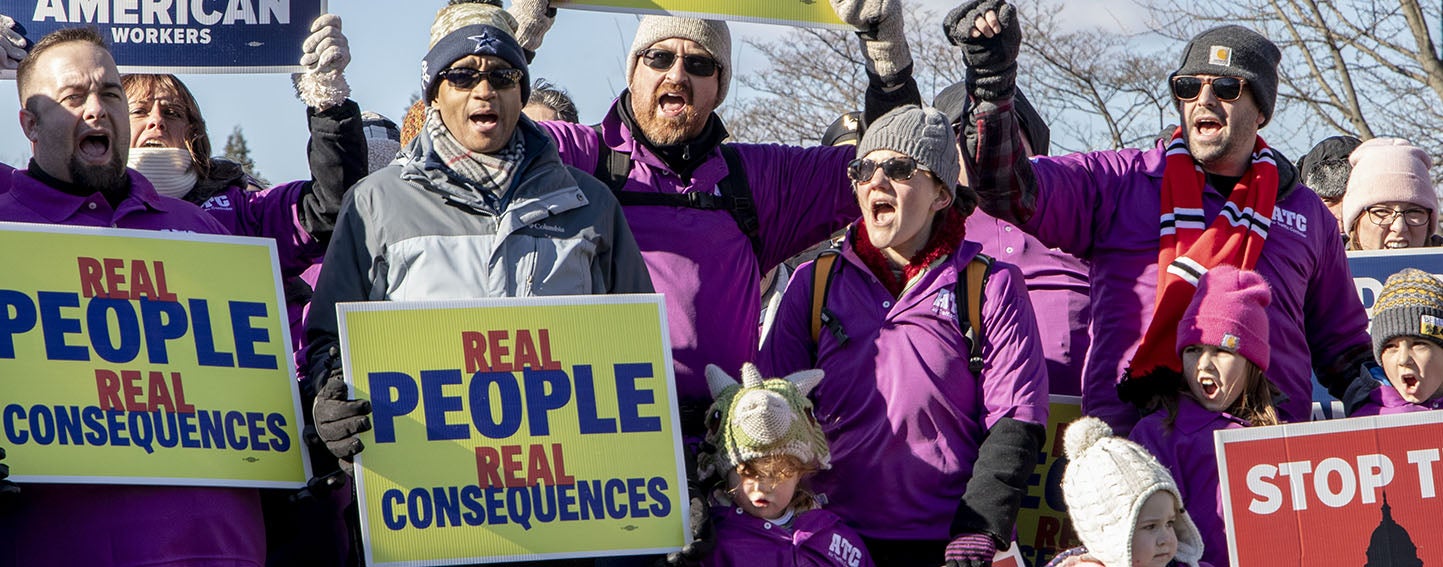

The longest federal government shutdown in the nation’s history is over, but, for many Americans, the effects on their health will linger. While government employees were guaranteed health insurance coverage during the five-week shutdown, federal contractors, new hires, and workers who recently changed health plans due to life events faced lapsed insurance, unfilled prescriptions, and unpaid medical bills. And if the White House and Congress don’t resolve their differences over the same issues that led to the shutdown, a similar disruption could be repeated in only two weeks’ time.
The government relies on millions of private contractors to keep federal agencies running, and according to the Washington Post, these contractors “have become an auxiliary force that often does much of the same work as rank-and-file government staff, but with secondhand job security.” Federal contractors working in agencies that closed during the shutdown have no legal claim to lost wages, and, to add insult to injury, some lost health insurance during that time.
Many Face Unintended Health Consequences
The Washington Post reported on the experience of Janice Morgan, a federal contractor with Unispec Enterprises. When she tried to fill an essential prescription for her husband, who has multiple sclerosis, she found out that her health insurance had been canceled because Unispec couldn’t pay the premiums during the shutdown. After the government reopened on January 25, Morgan returned to work at the Pipeline and Hazardous Materials Safety Administration, but her health insurance — and her husband’s costly medication — remains in limbo. “It feels like we are still hostages,” she said.
For some workers, the shutdown caused their out-of-pocket drug costs to skyrocket. Jazz Sexton was hired by the Internal Revenue Service in late 2018, so her health insurance was still being processed when the government closed. Without coverage, her antidepressant medication would have cost nearly $1,000 out of pocket. She couldn’t pay, so she began rationing her medication. “I was dizzy, things looked brighter to me,” Sexton told CNBC. “I was having very strange symptoms.”
Other government employees were unable to make changes to their health insurance. Julie Appleby wrote for Kaiser Health News and NPR that air traffic controller Joseph Daskalakis’ son was born a week into the shutdown. At 10 weeks premature, baby Oliver required special care in a neonatal intensive care unit (NICU) that was out-of-network for Daskalakis. Under normal circumstances, Daskalakis would have been eligible to change insurers since the birth of a baby is a qualifying life event, but the government shutdown meant no changes could be made. The family has already received an initial $6,000 hospital bill — not including the cost of Oliver’s birth or his stay in the NICU — and costly bills for the NICU care and out-of-network charges have yet to arrive.
Native Populations Suffer “Major Threat”
The shutdown also had consequences for Native American tribes, who long ago were promised that the US government would cover the costs of essential services like health care and education. The health care services are managed by the Indian Health Service (IHS), which is part of the Department of the Interior. HuffPost’s Jennifer Bendery reported that the IHS “provides health care to nearly two million American Indians and Alaska Natives through 45 hospitals and nearly 300 clinics in 35 states.”
During the shutdown, some IHS clinics had to furlough employees or reduce health care services, resulting in a lack of coverage for urgent and chronic care needs. Paulette Jordan, a former legislator in Idaho and member of the Coeur d’Alene tribe, told Bendery, “We live in health care deserts. If our health clinics close up shop on reservations in rural communities, it poses a major threat to Native people.”
Mitch Smith and Julie Turkewitz reported in the New York Times that the government shutdown cost the Sault Ste. Marie Tribe of Chippewa Indians in Michigan approximately $100,000 per day “of federal money that does not arrive to keep health clinics staffed, food pantry shelves full, and employees paid.” The tribe was able to cover the shortfalls with its own funds, but another shutdown may be devastating.
What Lies Ahead
For people like Jazz Sexton and Janice Morgan, the government shutdown was more than an inconvenience — it was a health risk. And even though it’s over, Vox’s Amanda Sakuma warns that the reprieve may only be temporary. She reported that President Trump “agreed to sign a continuing resolution that will reopen the federal government through February 15.” If the president and congressional leaders can’t agree on a solution by then, “the fight will drag on, leading to even more shutdown possibilities, or lawmakers will pass a continuing resolution that would make this entire standoff all for nothing.” In the meantime, the health care of many Americans hangs in the balance.
Authors & Contributors




